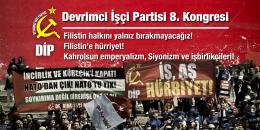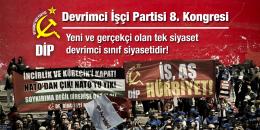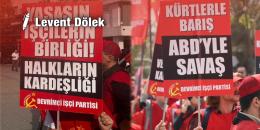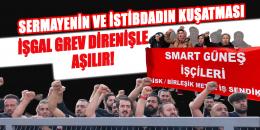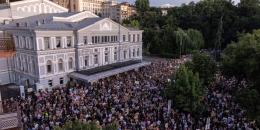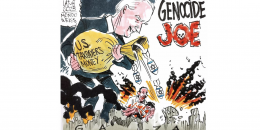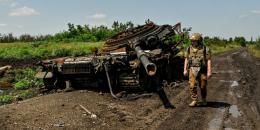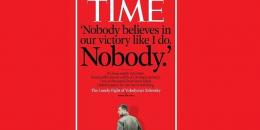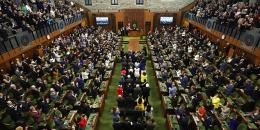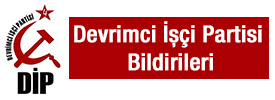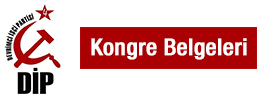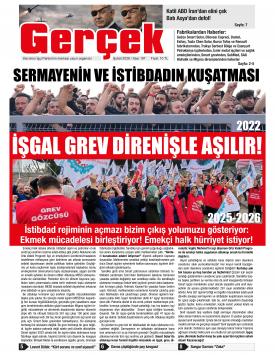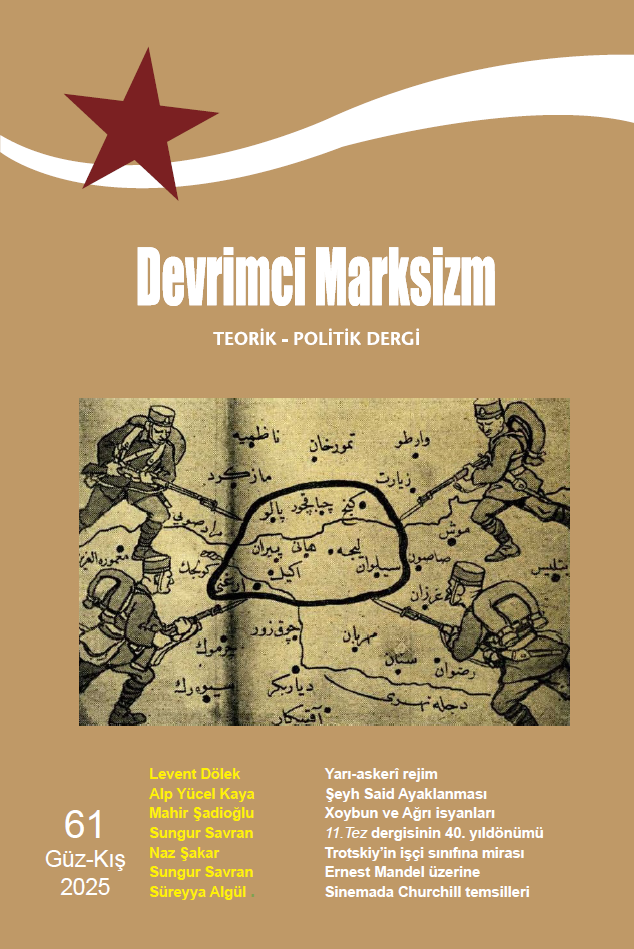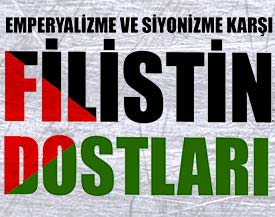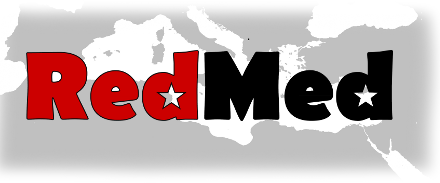DIP Declaration on Ukraine
NATO, US, and EU, hands off Ukraine!
Shut the Straits to NATO vessels!
Respect the will of the people of Crimea!
Only the Soviet flag can make peace between Russia and Ukraine!
The crisis in Ukraine, which started in December last year and pulled the country into a spiral of violence in February, has now entered a new phase: the Crimean parliament’s decision to hold a referendum on March 16 has put the possibility of the secession of the historic peninsula from Ukraine and its unification with Russia concretely on the agenda. This is an issue that can be exploited in Turkey because of the anti-Russian tendency of Crimea’s Tatar minority for historical reasons. Furthermore, Crimea may just be the first step of a larger process: since Russian-speaking people constitute the majority of the population in the eastern and southern parts of Ukraine, these regions are prone to cooperate with Russia. In addition to these regional questions, Russia’s mobilization of its military and Western imperialist countries’ threats of implementing harsh measures against Russia bring to mind the possibility of a war among great powers, although this is a very low possibility for now.
The Revolutionary Workers’ Party reminds the workers and laborers of Turkey the fact that what lies beneath the Ukrainian crisis is the US and EU imperialisms’ attempt to strengthen imperialism in Eurasia by incorporating Ukraine into NATO. The recent change of government is not a “revolution”. It is the consequence of an alliance of pro-Western bourgeois political forces and fascism winning the support of the masses. Ukraine is now facing two threats intertwined with each other: becoming a pawn of imperialism and falling into the dominance of a racist, anti-Semitic fascism. The question therefore has nothing to do with “democracy”! The question is imperialism and fascism and the struggle against these. The liberation of Ukraine lies in the Soviet flag, which was carried when the military forces of the two sides confronted each other in Crimea.
1. What lies beneath the events in Ukraine is the European Union’s attempt to incorporate six of the former Soviet republics (Ukraine, Belarus, Moldova, Georgia, Azerbaijan, and Armenia) into its realm of domination through its policy of “Eastern Partnership”. This program was launched through a summit in November 2013. The incidents in Ukraine are the direct results of this project. The Maidan incidents started after ex-president Yanukovych’s refusal of the “Eastern Partnership” under the pressure of Russia. Five of the six countries mentioned above are included in the EU’s “Neighborhood Policy”. To put things in comparative perspective, we can say that the Ukrainian tragedy is the product of the EU’s policy of “zero problems with neighbors”. What Syria means for Ahmet Davutoglu’s foreign policy, Ukraine means the same for the EU!
2. The EU’s attempt to establish hegemony over these six countries is not only the product of EU imperialism’s attempt to establish hegemony over the European continent as a whole. More importantly, it is a product of EU and US imperialisms’ attempt to terrorize the entire Eurasian region by incorporating Ukraine and others under the umbrella of NATO. The fact that this attempt came after Russia’s war against Georgia, which resulted in the secession of Abkhazia and Southern Ossetia from Georgia, provides evidence for the fact that after its defeat in Georgia, Western imperialism started a counter-offensive against Russia. The incidents in Ukraine are the results of NATO’s pressure towards expanding towards Russia’s periphery.
3. All these policies can be put in the context of the US policy of containing and isolating Russia (as well as China) since the collapse of the Soviet Union in 1991. As a result of this policy, the US started wars for strengthening its power in oil-rich regions (wars against Iraq in 1991 and 2003), preventing the survival of Yugoslavia as a strong ally of Russia (wars against Yugoslavia in 1995 and 1999), and establishing a base in Central Asia (the war in Afghanistan in 2001).
4. The reason why the rejection of the Eastern Partnership program created such a big upheaval in Ukraine is that the country’s western region had been ruled by the Austro-Hungarian Empire for a long time and therefore culturally feels closer to Western Europe. Following the collapse in 1991 of the Soviet Union, a workers’ state – albeit bureaucratically degenerated- and its division into 15 different countries, Ukraine fell into an unprecedented degree of misery and depravity along with other former Soviet republics. The resulting discontent of the Ukrainian workers and laborers led the people living in the western parts of Ukraine to view the EU as a path to salvation, a panacea. The peoples of Turkey can understand this situation since they also had experienced a similar process during the 2000s. However, the era of the Third Great Depression (since 2008) made the EU an economic executioner of the working class of the southern belt of Europe and changed the perception at least in Turkey. Kiev, on the other hand, is one of the few European capital cities where the EU still looks attractive!
5. This longing for EU imperialism added a new one to the chain of “fake revolutions” (also called “color revolutions”) that happened in the former workers’ states. Despite sharing certain characteristics with revolutions in terms of form, the great mass uprisings that happened in Serbia in 2000, Georgia in 2003 (the so-called “Rose Revolution”), and Ukraine (the “Orange Revolution”) are social events that are in essence pro-imperialist, supportive of deepening capitalist restoration, and counter-revolutionary in character. Ukraine 2014 should also be seen as a continuation of the same chain of events. The Maidan events are a sequel to this tradition of “fake revolutions”, not revolutions and revolts such as the ones that occurred in Tahrir in Egypt, Puerta del Sol in Spain, Syntagma in Greece, and Gezi in Turkey.
6. The attitude of the Ukrainian bourgeoisie (“oligarchs”) towards the Maidan events sheds further light on the things we have said above. Petro Poroshenko, the owner of the Roshen group and one of the richest people of the country, was the first person who read in front of the masses the decision in the official gazette concerning Yanukovych’s removal from his post. Poroshenko’s name circulated as one of the two candidates for the position of prime minister, along with Arseny Yatseniouk, who finally took the position. Victor Pinchouk (another super-rich owning a wealth of 3.6 billion dollars, who also happens to be the son-in-law of Leonid Kouchma – president of Ukraine between 1994 and 2004-, a close personal friend of Bill Clinton, and a pipe manufacturer used in gas pipelines) supported the movement vehemently in an interview published in Financial Times, and together with Rinat Akhmetov, the richest person of the country, condemned the government on January 18th for using violence against the protestors and became a supporter of the Maidan movement. Akhmetov himself became a supporter of Maidan after a certain stage although he is from Donetsk in the pro-Russian, eastern part of the country and was close to Yanukovych. The group of deputies controlled by Akhmedov played a role in Yanukovych’s removal from his post. The current government, the administration of president Alexander Turchinov and interim prime minister Yatseniouk, is following the proposal of Yulia Tymoshenko (historic leader of the “Orange Revolution”) to appoint oligarchs as governors of eastern provinces. Two billionaires have already been appointed to these posts: the steel baron Sergei Taruta became governor of Donetsk (which was first offered to Akhmedov, but refused) and Ihor Kolomoysky (steel, airlines, and media boss) became governor of Dniepropetrovsk. Contractor and banker Alexander Yaroslavsky’s name has been mentioned as candidate for Kharkiv, where pro-Russian protests are quite widespread. Rumor is circulating about the appointment of Vadim Novinsky (whose wealth is calculated by Forbes magazine as 1.9 billion dollars) to Crimea (the region over which the tensest debates/conflicts are taking place)! The politicians of the Maidan movement are the men of the US system. Victoria Nuland, the Assistant Secretary of State, notoriously calls Yatsenyuk “Yats” and Klitschko (the former heavyweight boxing world champion and another prominent leader of the Maidan movement) “Klitsch”.
7. In short, Maidan is the product of the bourgeoisie’s success in leading the masses towards a policy of integration with imperialism. On the other hand, there is one important point distinguishing the Ukraine of 2014 from the previous chain of “fake revolutions”: the strength of the fascist movement in the Maidan events. The strongest fascist movement of the country called Svoboda (Freedom!) and several smaller and even more hardline fascist groups, first and foremost Pravy Sector (Right Sector), have been able to completely control the center of the movement, Kiev’s Independence Square, called Maidan, for three months. They were in complete control of the movement’s military leadership during February. It can be said that despite Tymoshenko’s victory speech in the square following Yanukovych’s escape and the appointment of the bourgeoisie’s men of confidence as president and prime minister, the fascist movement is still the hegemonic force among the people of western Ukraine. Today the fascist gangs still constitute a parallel power in Kiev. It seems that more evidence regarding the responsibility of these groups in the orgy of violence before Yanukovych’s fall will soon come to surface. Very serious evidence has already been revealed. In a telephone conversation leaked to the internet between the High Representative of the Union for Foreign Affairs and Security Policy of the European Union, Catherine Ashton, and the Foreign Minister of Estonia, Urmas Paet, the latter said, “the conviction that the new coalition, not the Yanukovych supporters, are behind the snipers is strengthening”! This means that the people who rushed to the conclusion that it is Yanukovych’s butchery that is responsible for the bloodshed in Maidan had better have second thoughts about the role of the allies of imperialism!
8. The recent events in Ukraine constitute a calamitous development to the extent that they can be seen as the first great victory of fascism in Europe in the current context of the Third Great Depression. Those who try to view and present this case as a “revolution” are the new representatives of a long tradition within the left that gravely confuses form and content. Trotsky ridiculed those who were trying to present Hitler’s fascism and Stalinism as the same by pointing out that this meant equating fascists and those that were struggling against fascism. The theory of totalitarianism could not understand the dynamics of the bureaucratic workers’ states in general and the Soviet Union in particular and went bankrupt after the turning point of 1989-91. Another manifestation of this tradition within the left is that many currents coming from the revolutionary Marxist tradition confuse the 1989 uprisings in Eastern Europe as well as the “fake revolutions” of more recent times with real revolutions. By refusing to learn from the experiences of the last quarter century, the currents that embrace the movement of Ukraine 2014 are besmirching the name of revolutionary Marxism.
9. As our party correctly predicted in its first reaction to Yanukovych’s flight, Ukraine is on the brink of division. Crimea’s secession from Ukraine as a first step and the separation of the eastern and southern regions (where Russian culture and language are dominant) from Ukraine at later stages will amount to Ukraine’s division and Russia’s annexation of a part of Ukraine’s territory. Leaving aside exceptions such as Nagorno Karabakh, which do not have much strategic importance apart from the participants of the conflicts in question, this will be the first case in which any one of the 15 countries that were established following the collapse of the Soviet Union is annexing another’s territory. We are currently facing a very traumatic development for the international system. Since this means a confrontation of the West and Russia, it implies the first signal of the threat of a new world war.
10. The Revolutionary Workers’ Party does not have the slightest confidence in and support for the despotic and restorationist regime established by Russia’s leader, Vladimir Putin. However, it emphasizes the fact that the EU and the US, in their quest to re-partition the world in the post-Soviet period, are responsible for the current situation. In the infernal process unleashed by imperialism’s maneuvers, Russia is on the defensive. Russia is defending itself against NATO’s annexation of Ukraine (a country with a population of 46 million people), which could make its southern border insecure and lead to the loss of its naval base in Sevastopol in the Crimea, which is Russia’s window to warm seas. It is, of course, true that Russia is continuing its historical tradition of attempting to establish hegemony over the countries in its “near abroad”. Nevertheless, what is at stake here is not Ukraine’s search for winning independence and saving its honor against Russia. What is at stake is Ukraine’s fall under imperialist hegemony. Furthermore, this pro-imperialist orientation has not gained the support of a meaningful majority of the Ukrainian population, let alone Ukraine as a whole. The eastern part of the country, which is more proletarian than other regions, is against this orientation. Two interrelated recent incidents are of symbolic importance: two days after the removal of the commander of the Ukrainian navy’s fleet in Crimea from his post because of his pro-Russian stance, all the sailors in the frigate Hetman Sahaydachny revolted as it was crossing the Istanbul Straits! Both in the political struggle over eastern Ukraine and in case of a war between imperialists and Russia, the Revolutionary Workers’ Party will be against the imperialist camp, without extending the slightest political support to the Putin administration.
11. It is clear that imperialism, face to the resistance put up by Russia against its drive to hegemonize Ukraine, is pursuing a policy of threats and blackmail. In the deployment of this policy, sending warships to the Black Sea is a key move by the US. In 2008, Bush had dispatched a military vessel to the coast of Georgia under the guise of “humanitarian assistance”. Turkey should definitely ban the passage of NATO vessels into the Black Sea. USS Taylor, anchored at the Port of Samsun and already beyond the regular period of permission extended to such vessels under Montreux, should immediately be asked to leave. Tayyip Erdoğan is talking about a new “war of independence”, a total sham. The litmus test will be the policy pursued by the Erdoğan government vis-a-vis the Ukrainian crisis.
12. Crimea had been Russian territory since its annexation from the Tatar Khanate and the Ottoman Empire in 1738. In 1954, the secretary general of the Communist Party of the Soviet Union, Nikita Khrushchev, handed over the peninsula to Ukraine. Sixty years later, the majority (58 percent) of Crimea’s total population of 2 million is still Russian. Tolstoy fought on the ramparts of Sevastopol and Chekhov wrote his famous play, The Cherry Orchard while he was in Yalta. We are not talking about a territory that is totally unrelated to Russia! A referendum, a method that was not implemented in the many republics that were forcibly separated from Yugoslavia by imperialism, is scheduled to determine the fate of Crimea in which the people can express their will openly. Talking about “Russian imperialism” in this context is wrong for two main reasons. First, Russia is not an “imperialist” country in the Marxist sense of the term. Secondly, if you think the separation of Bosnia and Kosovo from Serbia is legitimate, then why would the separation of Crimea from Ukraine amount to “imperialism”? The DIP is for the unity of the former Soviet federation. For this reason, we advocate the unity of all the former Soviet republics instead of separations and unifications among these republics. However, we underscore the imperative that everybody should respect the will of the people of the people of Crimea, a region that already has the status of an autonomous republic.
13. The only serious problem in Crimea is the situation of the Tatars. Following the Russian annexation in 1738, many of the Tatars were forced to leave their homeland. They were expelled en masse to Central Asia in 1944 with the claim that they cooperated with Hitler. Only the children and grandchildren of that generation were able to return to their homeland after several decades. Tatars constitute a small minority in Crimea today (12 per cent). They are against the movement of unification with Russia because of their oppression by Russians throughout history. In the face of the exploitation by Turkish bourgeois media of Crimean Tatars’ legitimate concerns (they are even labeled “Crimean Turks”!), the Revolutionary Workers’ Party defends their national rights and will oppose any future discrimination against and oppression of them. However, we also invite the Crimean Tatars not to submit to imperialist policies. If the Crimean Tatars have become so destitute as to look to the donations of their relatives in Turkey, the responsibility of this shame lies on the shoulders of the oligarchs who plundered public property by destroying the workers’ state that guaranteed the supply of basic necessities and a life-long living wage to everybody. Crimean Tatars do not have any common interest with the oligarchs who have condemned them to live in misery! The fascists who provided the military force of the uprising in Kiev will turn not only against the Jewish people but also against the Tatars! Don’t let the fascists enter Crimea!
14. The events in Ukraine have once again demonstrated that national questions played a very big role in the collapse of the workers’ states that were founded in the twentieth century. Ukrainians willingly submit themselves to imperialism and fascism because of their anger against Russia. And yet they belong to the Slavic family (which is also called the “great Russian” family) that includes Russia, Ukraine, and Belarus! What then of the other peoples of the Soviet Union, the peoples of the Baltic, of the Caucasus, the Muslim and Turkic peoples! Even graver, think of the peoples of Eastern Europe who were oppressed even without formally belonging to the Soviet Union! This shows the far-sightedness of Lenin’s national policy and his struggle against Stalin and his fellow travelers who followed the policy of Russian chauvinism! Those who do not follow the national policy of revolutionary Marxism thus invite troubles that can last for decades if not centuries!
15. The people of Crimea, eastern Ukraine’s mining and industrial proletariat, and the Ukrainian laborers in general will not benefit from the pro-imperialist government of oligarchs that has recently been established in Kiev or from Putin who himself maintains the rule of oligarchs in Russia. The interests of the Crimean Tatars and the Ukrainian- and Russian-speaking people of Ukraine lie in the establishment of a new workers’ state based on the public ownership of the means of production and circulation, and a centrally planned economic structure that guarantees the supply of basic necessities to all people. The working masses’ interests lie in destroying the power of the oligarchs, reversing the process of capitalist restoration, and taking power in their hands. However, different from the pre-1991 period, this should happen under the framework of a proletarian democracy. This should happen by replacing Russian chauvinism with internationalism both inside and outside the country. The Soviet flag has reappeared during the recent confrontation of the military units in Crimea! Soldiers ask each other: “tell me, are you really going to fight against the Soviet flag?” What great respect to the flag that is the product of the October Revolution, a quarter century after the collapse of the Soviet Union! The flag with the hammer and the sickle, that is the flag that will bring emancipation not only to Ukrainians and Russians but to all the other peoples of Eurasia as well!

